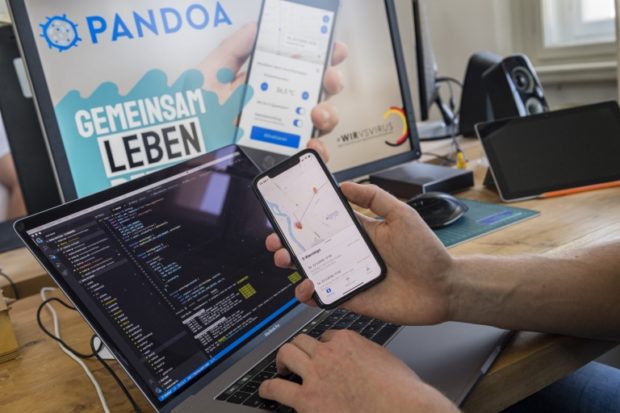
Software developer Robert Guehne programs the mobile application with the project name ‘Pandoa’ to compare motion profiles of users of this software in Halle/Saale, eastern Germany. Image: AFP/Jens Schlueter
In early April, the German government announced that it was working on a voluntary smartphone app using Bluetooth to trace possible chains of COVID-19 contagion.
The project has led to some lively discussions in a country where personal privacy is fiercely guarded, thanks to the scars of two 20th-century dictatorships.
Chris Boos, the founder of Frankfurt-based artificial intelligence company Arago and a member of the German government’s Digital Council, has been helping to develop a software platform for the app.
Q: When will the COVID-19 contact tracing app be available in Germany?
“We will see it launched at the end of April, that seems realistic to me. Everyone wants it as soon as possible, but it has to be tested and certified for security first.”
Q: What are some of the key characteristics of the platform?
“Firstly, the system has to be based on the right variable (contact between mobile phone users) to avoid comparing apples with oranges. Secondly, privacy must be protected. No location data is used, nor any data that would identify the phone, such as the SIM card number. And finally, the system has to work internationally, so I can travel freely to countries that use the same platform.”
Q: What about privacy concerns?
“From the beginning, we were clear that we did not want to recreate the situation in some Asian countries where people are completely exposed. I don’t see a problem as long as we offer a secure alternative that respects data protection laws.”
Q: The technology relies on Bluetooth. How can you guarantee its reliability?
“Bluetooth technology can measure the distance between two phones very accurately using radio waves. We can then determine very quickly whether this measurement is epidemiologically relevant; in the simplest case, if the two phones were less than 2 meters apart for more than 15 minutes.”
Q: How can you avoid people declaring themselves sick on the app when they are not actually sick?
“Before the process begins, you must always have voluntary confirmation from the user themselves that they are sick, but also from a doctor treating them or another healthcare provider.”
Q: Why are Germany, France and other countries each working on their own apps rather than focusing on a communal project?
“The important thing with these various apps is that they will eventually be able to work together. Because if that’s not the case, borders will remain shut.”
Q: How many people will have to use the app for it to have the desired effect?
“An Oxford University study has indicated that 60% of the population would have to use this app if there are no other measures to control the spread of the coronavirus. The fewer people use the app, the more stringent measures will be needed.”
Q: How will the app be delivered to the public?
A: “The Robert-Koch Institute (Germany’s public healthy agency) seems to me to be the natural place to deliver it and it is no secret that they are working on the project. But we will see who can provide the best solution. I am sure the government will make its recommendation.” JB
RELATED STORIES:
Drones take Italians’ temperature and issue fines
Study on health impact of COVID-19 lockdown reveals who might be most at risk from poorer well-being